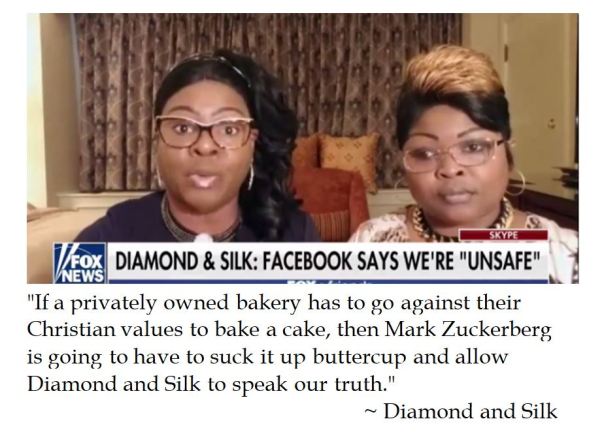Prominent conservative voices in social media, such as Diamond and Silk and Dan Bongino, have vociferously voiced outrage that Big Internet has banned them as being unsafe for the social media community because of their outspoken ideological opinions. This parallels YouTube demonetizing many of Dennis Prager's popular Prager U videos because the conservative views expressed did not sync with the progressive views of their internet overlords. And Twitter is infamous for shadow banning conservatives, even Senator Ted Cruz, without recourse or equal application against outrageous leftist Twits.
Diamond and Silk, who gained fame through their vigorous defense of then Presidential candidate Donald Trump during the 2016 campaign, did not silently take this rough trade from Facebook. On Fox and Friends, Diamond and Silk postulated that Mark Zuckerberg needed to "[S]uck it up, buttercup" and accept diverse viewpoints and freedom of speech on its social network, just as the small Indiana pizzeria would be forced to cater a same-sex wedding despite their religious objections to the ceremony.
Alas, Diamond and Silk have a weak case in a court of law. Without meandering into the details of RFRA and First Amendment religious liberty, same-sex marriage proponents could point to civil rights legislation which the Supreme Court in Obergefell v. Harris claim a right to dignity for that class. What protected class can Diamond and Silk rightfully claim against Facebook?
However, in the court of public opinion, Facebook engaging in ideological viewpoint discrimination could be a compelling case for action. Does MySpace mean anything to Mark Zuckerberg? That was a social media precursor to Facebook, but when it stopped being cool, it became ghost of itself and a dark web conduit. Facebook is much bigger and is receiving congressional scrutiny. Between viewpoint discrimination and revelations of data mining, shareholders should be concerned if Facebook were to become a fraction of its former self.
Facebook has ceased to be a mainly youth oriented site. Adults may well chafe at having their lives data sold by the social media company. But for motivated conservatives, this cyber censorship may well have this active demographic find alternatives to speak freely, like on GAB.
Diamond and Silk, who gained fame through their vigorous defense of then Presidential candidate Donald Trump during the 2016 campaign, did not silently take this rough trade from Facebook. On Fox and Friends, Diamond and Silk postulated that Mark Zuckerberg needed to "[S]uck it up, buttercup" and accept diverse viewpoints and freedom of speech on its social network, just as the small Indiana pizzeria would be forced to cater a same-sex wedding despite their religious objections to the ceremony.
Alas, Diamond and Silk have a weak case in a court of law. Without meandering into the details of RFRA and First Amendment religious liberty, same-sex marriage proponents could point to civil rights legislation which the Supreme Court in Obergefell v. Harris claim a right to dignity for that class. What protected class can Diamond and Silk rightfully claim against Facebook?
However, in the court of public opinion, Facebook engaging in ideological viewpoint discrimination could be a compelling case for action. Does MySpace mean anything to Mark Zuckerberg? That was a social media precursor to Facebook, but when it stopped being cool, it became ghost of itself and a dark web conduit. Facebook is much bigger and is receiving congressional scrutiny. Between viewpoint discrimination and revelations of data mining, shareholders should be concerned if Facebook were to become a fraction of its former self.
Facebook has ceased to be a mainly youth oriented site. Adults may well chafe at having their lives data sold by the social media company. But for motivated conservatives, this cyber censorship may well have this active demographic find alternatives to speak freely, like on GAB.













